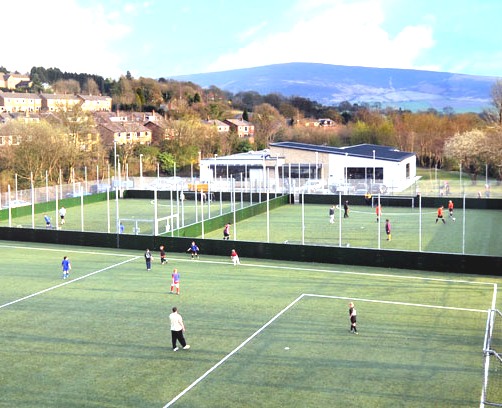
Saddleworth's 3G pitches with the Pennines serving as a backdrop
Trust and transformation
With eight years of trading under its belt Oldham Community Leisure Limited (OCLL) is something of an elder statesman when it comes to the cooperative model. Ian Kendall tells how OCLL went from failing council-run service to valued partner and shares his top tips for any organisation starting its own journey to employee-owned status.

Saddleworth's 3G pitches with the Pennines serving as a backdrop
Oldham Community Leisure Limited (OCLL) was launched in 2002 to transform the management of sport and leisure facilities in Oldham. The cooperative model was chosen after a great deal of consultation with the council, trade unions and staff. OCLL trades as an industrial and provident society, which does not give dividends to staff as they have a share and vote in the system. This means that all the profit generated goes back into the business. Eight years into our journey as a community benefit society I can say that this decision was definitely the right one. The statistics speak for themselves: by the end of this year our cost to the council will be the same as in 2002, but the organisation's income has tripled to £6.7 million a year; a staff survey revealed that 98% of employees would not want to go back to council employment if given the choice; and our staff sickness rate has declined from 6.8% in 2002 to 2.4% this year.
In the early days there was uncertainty about how well this model would work, a fact borne out by a contract stipulation that required OCLL to retain the services of a private sector leisure management contractor in order to increase our chances of success. The partnership worked really well and helped us establish a firm foundation but I am pleased to say that, having proved ourselves within the first contract period, this requirement was dropped when our contract was renewed.
Mutuals seem to be having their 15 minutes of fame, with the Cabinet Office announcing a raft of measures designed to make things easier for organisations considering the transition to employee-ownership. I welcome this push from central government but offer a word of caution: while I believe this model is the way forward, it is not easy and it takes time to get established. It has taken OCLL eight years. In fact, I call the stages of the journey ‘the three Cs’: consultation, confidence and cash! The first is obvious; consult widely to get as many people as possible onboard. The next stage is earning the confidence of people and organisations such as primary care trusts (PCT) and local authorities and that takes time. Once you have that, the cash, in terms funding from organisations using your services and/or grants, will come in.
While our experience has been largely positive, there have been challenges and, with Oldham Council, like other councils across the country, facing massive budget cuts, there will be more to face in the future. Take a look at the figures: in 2002/3, the first full year of trading at OCLL, the management fee was £1,686,000; in 2011/12 the budget is set to be £1,690,000. In effect OCLL has not only maintained services but has substantially enhanced them at a cost of £4,000.
During this period OCLL has: seen utilities increase in cost by £300,000 per annum; paid out more than £200,000 in inflationary wage rises per annum; invested £250,000 each year into facility improvements and assets that are owned by the council; dealt with closure of facilities that had previously generated over £100,000 per annum with insignificant cost; increased employment in the borough by 55 posts; and had to re-engineer the business to deal with competition for the leisure pound. Despite all of these challenges, the council funding now only equates to 26% of our income, down from 53% in 2002/3.
Another benefit of this way of working is having the autonomy and flexibility to get involved with innovative and exciting community initiatives. We are currently working with a number of partners, including Oldham Athletic Community Trust, Oldham PCT, and Greater Manchester Police. These projects are seeing some great results. In fact one initiative, Go! Oldham, has brought about a 45% drop in anti-social behaviour, a statistic that prompted Chief Superintendent Tim Forber to say it was the biggest drop he had ever seen.
The future is challenging but there are some excellent operators in this sector who can offer councils and other bodies the support to transform their services. However, in order to gain the confidence that I mentioned earlier we need proper performance monitoring and robust evidence to justify continued investment in cultural activities. For OCLL this includes figures such as that of a 45% drop in anti-social behaviour quoted above which represents a significant saving to the criminal justice system and the 55 new jobs which benefit not only the individuals concerned but also contribute to the economic improvement of the town.
Ian Kendall is the chief executive of Oldham Community Leisure Limited which runs 15 sports and leisure facilities on behalf of Oldham Council. Ian is happy to talk to anyone interested in finding out more about this model. You can contact him at ian.kendall@ocll.co.uk
The Leisure Review, April 2011
© Copyright of all material on this site is retained by The Leisure Review or the individual contributors where stated. Contact The Leisure Review for details.
Download a pdf version of this article for printing